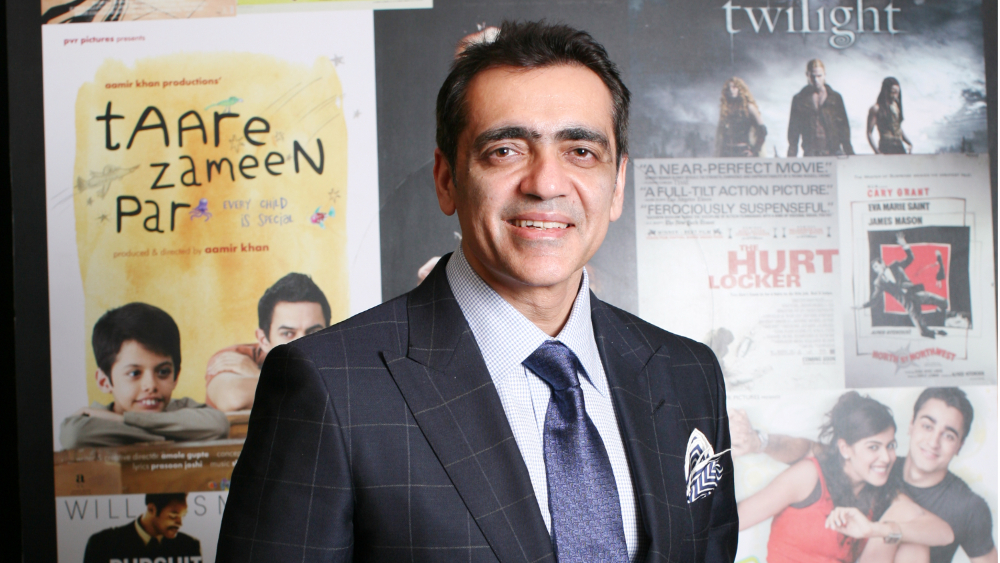PVR Inox Chief Ajay Bijli On Growth Plans Of India’s Multiplex Chains
Ajay Bijli, the managing director of India’s largest multiplex chain PVR Inox, has unveiled plans for the group’s growth.
The merger of the PVR and Inox chains concluded in February and the merged entity now operates 1,683 screens in 360 sites across 115 cities throughout India and parts of Sri Lanka. Bijli has been accorded the honor of delivering the exhibition keynote address at the international day of CinemaCon, Las Vegas (April 24-27) in recognition of his role as a thought leader in the theatrical exhibition space.
Despite a vast and flourishing film industry that produces more than 1,600 films annually and a population of 1.4 billion, India has only 8,700 screens, compared to China, which boasts more than 80,000 screens for a similar population size.
Bijli’s first task is to increase the group’s screen count. “We have a clear visibility of adding 200 screens per annum over the next two years and jointly opened 168 screens across 30 properties in 24 cities in the financial year 2022-23,” Bijli told Variety. “We have a diversified screen network across 115 cites and we want to make the brand aspirational and accessible by further expanding in tier two and tier three cities and take the modern multiplex experience to new cities and towns across the country. We would be increasing our share in the premium format category with our focus to make cinemas more and more experiential.”
Meanwhile, the merger has led to several synergies. Bijli says that these will lead to significant margin expansion in revenues from box office, food and beverage and advertising, and cost savings in both capital expenditure and operating expenditure thanks to an integrated supply chain and overhead rationalization.
“The synergy benefits are turning out to be much more than what we first expected and [we expect to be] a lot leaner yet stronger due to the merger,” Bijli said. “Our vision is to create one of the best cinema exhibition companies across the globe. Both the companies – PVR and Inox have historically known and respected each other’s business for many years. The merger would leverage scale to drive operational efficiency, a strong balance sheet that can withstand any similar events in the future. It would provide long-term value creation for all stakeholders including customers, real estate developers, content producers, technology service providers, the state exchequer [and] employees. PVR Inox would continue innovating, being creative, invest in technology and reinvent the movie going experience.”
As in many parts of the world, Indian audiences are slow to return to cinemas, which are now fully reopened after being shut down for several months during the pandemic.
“Streaming services offer only content which can be watched on multiple devices. Cinemas offers experience, an integral part of our social fabric and [which is] hard to replicate at home. Consumers are looking for experiences which we deliver in cinemas which is the No.1 out of home entertainment option in India,” Bijli said.
The strategy to lure audiences back includes comfortable seating, recliner seats, digital and laser projection, sophisticated sound systems, Imax and other premium large format screens, 3D, 4D and a wider variety of food and beverages. Content will be diversified and will include event cinema, cultural programming, sports, musical concerts, documentaries and live sports.
Ticket prices and the cost of concessions is another major factor shaping the cinema-going experience in India.
“Even though in two years of a shutdown, inflation was very high, close to 7% in India, we stuck to a not more than 5% increase annually in ticket pricing,” Bijli said. “There is a certain section of audiences that is still taking time to come back but not in the same frequency as before COVID. We will do a lot of segmented marketing to get this audience base back. For instance, we have just launched a unique INR1 ($0.01) trailer screening show for watching 30 minutes of 10 handpicked trailers of the latest movies. With people watching trailers on the small screen of their phones, a potent marketing tool for movies, they were not excited to watch the movie on the big screen. We received a phenomenal response to this ongoing initiative with people coming back to cinemas in large numbers.”
For ticket prices specifically, the group is planning to launch different packages and promotions to attract customers. Both PVR and Inox have a loyalty program and the group plans to integrate the database of customers by using technology to talk to them directly and provide them offers through emails, texts and WhatsApp messages, based on their previous viewing habits.
“Our focus is more on getting more people inside, rather than looking at ticket price. We would be focusing on improving programming and removing disparities in the ticket price. Wherever we feel the scope for the average ticket price to come down, we would be agile to quickly absorb that,” Bijli said.
The release of “Pathaan” saw some 25 previously-shuttered single-screen cinemas reopen. Bijli welcomes the move. Single screens outnumber multiplexes in India and Bijli says that there is room for growth.
“One leg of our business is joined at the hip with the film industry and one leg with the retail industry and shopping center developments. India is going through a phase of organized retail with shopping centers and malls coming up. Cinemas being an important part, typically a mall always plans for four to six screens depending upon the market,” Bijli said. “In some cities and catchments, consumers still haven’t seen organized multiplexes. We are not here to make utilitarian cinemas where content is the only attraction. We are here to increase the ‘wow’ factor of cinemas and make cinema-going an event and a celebration for people to dress up and go out to watch movies in India.”

